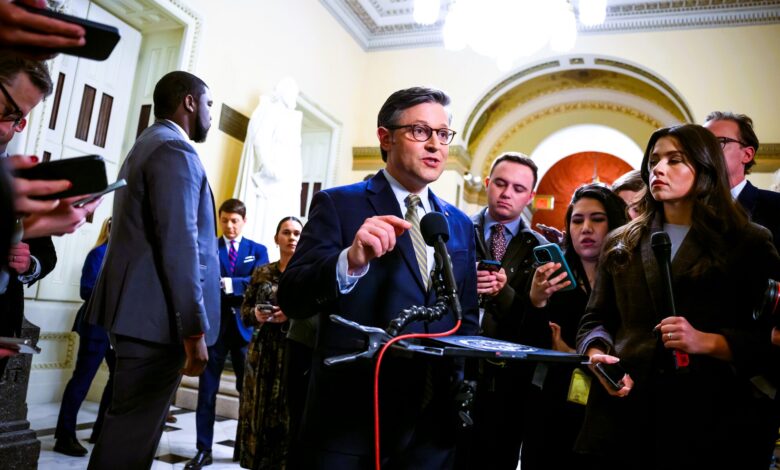The Speaker of the House Vote Explained: How the Election Shapes U.S. Politics

The Speaker of the House of Representatives is one of the most powerful positions in the U.S. government, second only to the President of the United States in the presidential line of succession. As such, the Speaker of the House vote is a crucial event that shapes the country’s legislative agenda and political direction. Understanding how the Speaker of the House vote works, why it’s important, and how it influences U.S. politics is essential for anyone who wants to grasp the inner workings of the American government.
In this article, we will explain the Speaker of the House vote in detail, examine its significance, and explore the key factors that influence the election of the Speaker. By the end, you’ll understand how this vote impacts U.S. politics and why it matters to every American.
What is the Speaker of the House?
The Speaker of the House is the presiding officer of the U.S. House of Representatives, one of the two chambers of the United States Congress (the other being the Senate). The Speaker is responsible for overseeing the legislative process, ensuring that rules are followed, and guiding the flow of debates and votes in the House. The Speaker also plays a critical role in representing the House to the President and the Senate, often serving as a leader of their respective political party in Congress.
Beyond administrative duties, the Speaker of the House has significant influence over the legislative agenda. The Speaker decides which bills will be debated on the floor, which committees will review proposed legislation, and often sets the political tone in the House. As such, the Speaker can influence the lawmaking process and national policies.
The Speaker of the House is elected by the members of the House of Representatives, and the process of this election is one of the first acts performed when a new Congress is convened.
How the Speaker of the House Vote Works
- Nomination Process
Before the vote, political parties in the House will nominate candidates for the position of Speaker. In most cases, the majority party (the party that holds the most seats in the House) will nominate its candidate, who is typically expected to become the next Speaker. However, opposition parties may also put forward their candidates.
For instance, if the Democratic Party holds the majority, it will nominate a Democratic representative to be Speaker, while the Republican Party may nominate one of its own for the role. The Republican candidate is unlikely to win unless the House is extremely divided or there is a shift in party control.
The nomination process usually takes place before the new Congress’s first session, during which House members will meet to elect the Speaker.
- The Voting Procedure
Once nominations are made, the House conducts a vote. Members cast their votes in a roll-call manner, meaning each member’s vote is recorded publicly. A candidate must receive a majority of the votes to win the election. In most cases, this majority is 218 votes, assuming that all 435 members of the House are present and voting.
If no candidate receives a majority, the House will hold additional rounds of voting until a Speaker is elected. This can sometimes lead to protracted negotiations and delays, mainly if the majority party is deeply divided or if there is a significant minority faction that refuses to back the party’s nominee. Historically, multiple rounds of voting have been needed to select the Speaker, resulting in lengthy political battles.
- The Role of Party Leadership
The Speaker’s election is strongly influenced by party leadership. The majority party usually ensures that their candidate has enough votes to win. However, there can be instances of rebellion within the majority party, where members may vote against the party’s nominee for Speaker. This situation occurred in the 2015 Speaker vote when a faction of conservative Republicans refused to support John Boehner, the incumbent Speaker, leading to his eventual resignation.
The vote for Speaker also reflects the strength and unity of party leadership. A smooth, uncontested ballot indicates party cohesion, while a drawn-out vote can indicate fractures within the party.
- The Importance of the Speaker’s Role
While the Speaker is technically a “neutral” figure during debates, in practice, they are often deeply involved in their party’s political agenda. This dual role as presiding officer and political leader gives the Speaker immense power to shape the House’s agenda. The Speaker can prioritize specific bills, choose which members serve on influential committees, and even control the legislative calendar.
In addition, the Speaker is often considered the face of the party in the House. This position allows the Speaker to significantly influence public policy, elections, and the country’s political discoursecountry’s political discourse. A Speaker who is effective at rallying their party can set the legislative tone for the entire Congress, and their actions can impact everything from healthcare policy to tax reform and beyond.
How the Speaker of the House Vote Shapes U.S. Politics
The Speaker of the House vote is not just an internal political process—its impact reverberates throughout the country. Here’s how the vote can shape U.S. politics:
- Influences the Legislative Agenda
Once elected, the Speaker has the power to determine the legislative agenda in the House of Representatives. This means they can influence which issues are prioritized. A Speaker from one party may bring forward legislation that aligns with their party’s platform, while a Speaker from the opposition may block or alter bills that contradict their party’s values. For example, if the Speaker is a Democrat, they may push for progressive reforms like universal healthcare or climate change legislation. At the same time, a Republican Speaker may focus on tax cuts and reducing government spending.
- Impacts National Policy
The policies passed by the House, guided by the Speaker, can have long-lasting effects on national policy. While the Senate and the President must also approve any proposed laws, the Speaker of the House plays an essential role in deciding what legislation reaches the floor for a vote. If the Speaker can rally enough support within the House, their party’s policies can make it to the Senate, shaping the direction of U.S. lawmaking for years to come.
- Establishes Party Unity or Division
The Speaker of the House vote often acts as a litmus test for party unity. If a party can quickly rally behind a candidate and elect the Speaker, it is usually seen as a sign of strength. Conversely, if the vote drags on with multiple rounds of voting and infighting, it signals deep divisions within the party. This internal conflict can negatively affect the party’s ability to govern effectively and pass meaningful legislation.
- Determines the Success of the Majority Party
The success of the majority party in Congress often depends on the Speaker’s ability to lead effectively. A strong Speaker can steer their party’s priorities through the House and ensure their agenda is pursued. On the other hand, a weak or divisive Speaker may struggle to gain consensus, leading to gridlock and a lack of progress. The Speaker’s leadership style and ability to manage dissent within their party are critical factors in determining the success of the majority party during their term.
- Affects the Balance of Power Between Branches of Government
Since the Speaker of the House is second in line to the presidency, the Speaker of the House vote also has implications for the balance of power in the U.S. government. While the Speaker is unlikely ever to assume the presidency, their position as a political leader can alter the dynamics between the legislative and executive branches. A Speaker aligned with the President’s party can help push through the President’s agenda. In contrast, a Speaker from the opposing party may lead efforts to oppose or block the President’s policies.
Conclusion
The Speaker of the House vote is one of the most critical events in the political calendar of the United States. It’s a vote that determines the leader of the House of Representatives, sets the legislative agenda, and influences national policies. The outcome of this vote is crucial not only for the House but for the entire country, as it affects the direction of U.S. lawmaking and the balance of power between the branches of government. Understanding how the Speaker is elected and why the position matters is essential for any citizen interested in U.S. politics.
Whether you’re following the latest Speaker vote or simply trying to understand the process, it’s clear that the Speaker of the House plays a central role in shaping the nation’s future. The Speaker is more than just a figurehead; they are a powerful political force who can influence everything from national security policy to healthcare reform.
Frequently Asked Questions (FAQs)
- What is the Speaker of the House vote?
The Speaker of the House vote is the election held at the beginning of each new session of Congress, where members of the U.S. House of Representatives vote to elect the Speaker of the House. The Speaker presides over the House and significantly influences legislative priorities and lawmaking processes.
- How is the speaker of the house vote of the House elected?
A majority vote of the members of the House of Representatives elects the Speaker. If no candidate receives a majority of votes in the first round, additional rounds of voting are held until a Speaker is elected.
- Can the Speaker of the House be from the minority party?
Technically, the Speaker of the House can be from the minority party if the majority party fails to elect a Speaker or if there is a split vote. However, in practice, the Speaker is almost always a majority-party member.
- Why is the speaker of the house vote of the House important?
The Speaker of the House is crucial because they control the legislative agenda and decides which bills are
You May Also Read: https://usasmartnews.com





